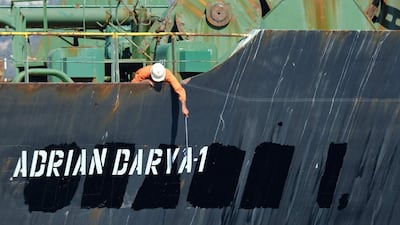The United States has sanctioned the Iranian tanker Grace 1 — which has been renamed Adrian Darya-1 — and designated its captain a terrorist for actions that benefit the Islamic Revolutionary Guard Corps' foreign wing, the Quds Force.
An executive order identifies the vessel as "blocked property" and a statement released by the Department of the Treasury late on Friday said that Kumar Akhilesh, who has assumed the role of captain of the vessel since its release from detention in Gibraltar earlier this month, has been listed as a Specially Recognised Global Terrorist.
The label is reserved for those who have committed or pose significant risk of committing acts of terrorism, or those who have supported terrorists and terrorist organisations.
The US says the tanker is linked to Iran's Revolutionary Guard, which it designated as a terrorist organisation earlier this year.
"[Akhilesh] is now a designated individual and will suffer significant negative consequences. Any who would consider supporting the IRGC should heed this warning," the statement said.
The ship and its captain will now be denied access to the US financial system and have any US assets frozen. Any US citizens who attempt to defy the sanctions by will also face consequences, a press release said.
Tensions between Washington and the Tehran have been fraught in recent months after the US withdrew from the 2015 nuclear deal. President Donald Trump has reimposed stringent sanctions on Iran, seeking to completely cut off its revenue from oil exports and leaving their economy struggling.
The Grace 1 supertanker was released on August 18 after being held by the UK in Gibraltar for five weeks on suspicion of carrying oil to Syria in breach of European Union sanctions, despite a last-minute legal bid by the US to have it detained. It changed its name to the Adrian Darya-1 and was reflagged as Iranian — it had previously sailed under a Panamanian ensign.
The destination of the tanker still remains unclear. On Friday, it was relisted as heading for the Turkish port of Iskenderun, according to tanker tracking websites, and as of Saturday morning it was just north of Cyprus. However, Turkish Foreign Minister Mevlut Cavusoglu said it was heading to Lebanon.
Lebanese officials said they had no knowledge of the Grace 1 being bound for Lebanon.
Grace 1 had been headed for Kalamata in Greece after leaving Gibraltar, but it changed course to the Turkish port of Mersin on August 23 after Greek authorities said they would not provide it with any services.
The ship is carrying 2.1 million barrels of Iranian crude that was on Monday sold to an unnamed buyer. The following day, it changed course to an unlisted destination.
Its detention followed the seizure of the Stena Impero, a Swedish-owned tanker sailing under the British flag, in July by the IRGC.
"The Iranian regime continues to foment regional conflicts, develop and proliferate ballistic missiles, hold foreign citizens hostage, brutalise its own people, and sponsor terrorism on an unprecedented scale. It is also expanding its uranium enrichment-related activities. The United States will continue to increase pressure on the Iranian regime until it changes its behaviour," Friday's statement said.


